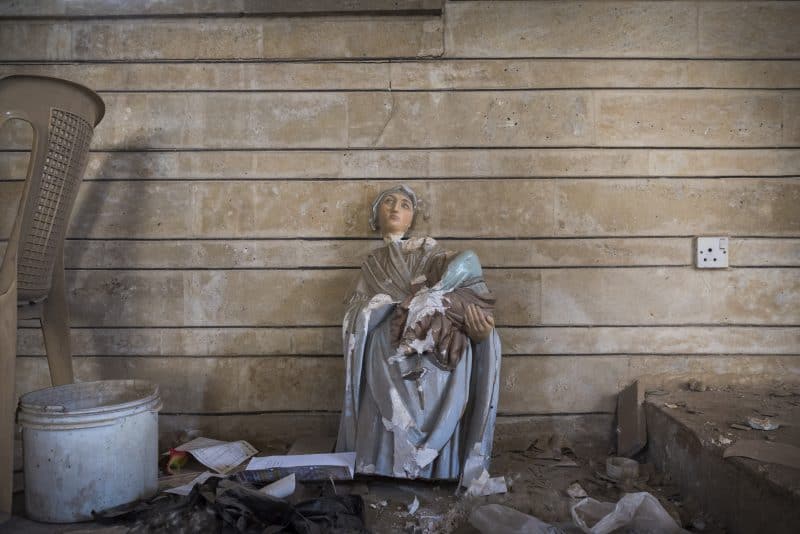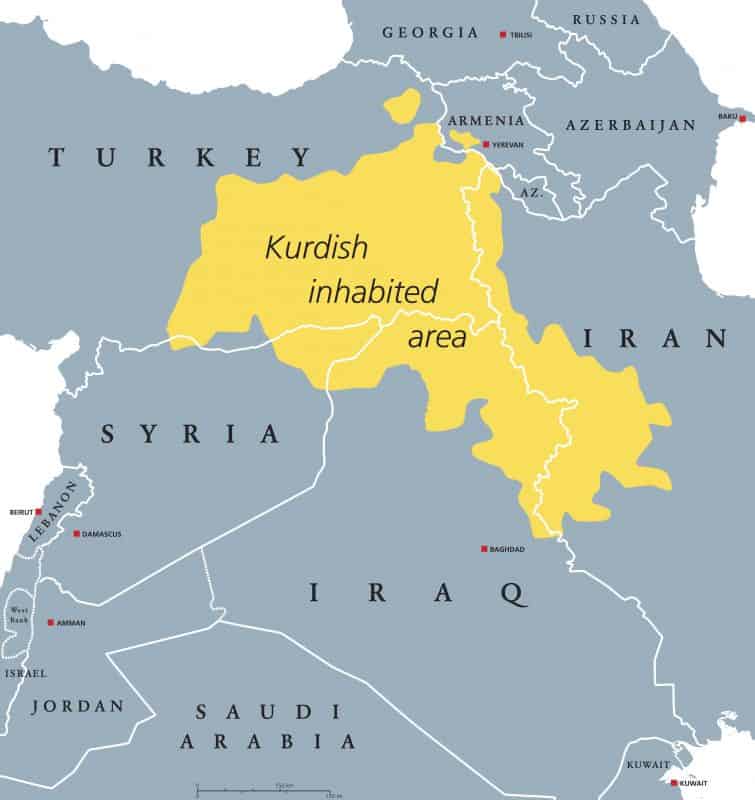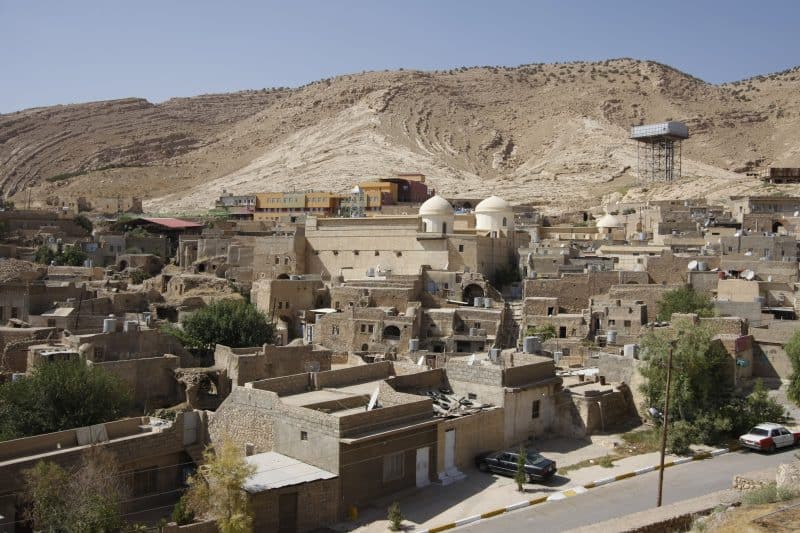After Saturday Comes Sunday
The heartland of the Chaldeans always was northern Iraq – the Nineveh Plain - and nearby areas of Syria. The Assyrians lived primarily in the mountainous heights of southeastern Turkey and Iran. Now as ISIS and its multiple successor organizations have murdered the Christians and chased them out of their villages, Aramaic is endangered as never before, and it could finally die as a spoken language.
How did I become interested in Chaldeans?
Over 40 years ago, as a young pediatric surgeon, I operated on a little northern Iraqi Chaldean boy and his aunts came to the hospital to translate. In the course of many weeks of treatment, I was drawn into a large, loving, extended Chaldean family and one of the aunts, Norma Hakim, became my adopted mother. After many years of sitting in the kitchen with Norma and her family, eating Chaldean food, dancing at Chaldean weddings and celebrating so many holidays together, I feel like one of the family. Thus, I was deeply affected when the Chaldeans in Iraq began to face horrific attacks at the hands of ISIS.

Recognizing that few in the U.S. really understand who Chaldeans are or what is at stake, I began to study them, starting with their language and their historic origins. A book resulted, After Saturday Comes Sunday, and I have dedicated it to Norma Hakim. The book tells many tales, starting with the story of the early Christians in the Middle East, the story of their churches, their patriarchs and their schisms, and the personal story of Norma. She and her family gave me vivid descriptions of life in Telkaif, Iraq, where she was married at age 12 in 1937, and her daughters told me funny tales of their visit back to Telkaif years later. I learned what it was like for her to became part of one of the original families in Detroit’s 120,000 strong Chaldean community and what happened when prominent Iraqi officials visited them in suburban Detroit, Michigan. Meanwhile, I often became one of the 50 people for whom she cooked every day. Today she is a 93 year old matriarch with 19 grandchildren and 17 great grandchildren who still hides the key ingredient in some of her recipes.
Pursuing my research in Israel, I discovered the Kurdish Jews. As I studied their history, I learned that they had been airlifted to Israel from Iraq in 1950-51, and in Jerusalem I was able to meet Batia Aloni, a social worker from one of the Kurdish Jewish families from Zahko, Iraq. Sitting with Batia and another compatriot, we laughed and joked in Hebrew and Arabic, in many ways resembling conversations around the kitchen table in the Hakim home. After all, both communities came from Iraqi Kurdistan. I knew that I had to tell their story too.
What do the Chaldean and Assyrian Christians and the Kurdish Jews have in common?
They all come from Kurdistan, the country that today’s Kurds hope to establish. And both have been in mortal danger in the Middle East. In daily life, they both occupied the same position in society – dhimmis – protected minorities in a Muslim world, given certain rights, but always second class citizens. In big cities though, they were the ones who pursued commerce, stock trading and civil administration. In the worlds of philosophy and science they both translated the works of the ancient Greeks into Aramaic, from which it became possible to translate them into Arabic, Turkish or Persian. They met each other through trading during peaceful times, and when they were under attack they sought shelter with each other.

They all spoke dialects of Aramaic. But it was not just a language of prayer, or literature, or study; for them it was a living language, at least in their villages. Of course the language is often supplanted by the dominant language of the land in big cities and in the Diaspora, to which they are rapidly scattering. Now if ISIS destroys their villages, this language will become moribund, in our lifetimes. Only if the Chaldeans and Assyrians can safely return, rebuild and resettle in their villages will their language, the distinctiveness of the people and their culture still survive.
Can we help them?
Chaldeans and Assyrians can only return to their villages if their families can have a reasonable expectation of living in peace and security. In Syria, they must wait until the Syrian Civil War ends. In Iraq, they need guarantees of basic human rights, civil rights and a constitution that gives them political representation. Wherever they go, Chaldeans and Assyrians need to be able to establish their own trained security forces, commanded by their own officers. To achieve these goals, they will need help from the international community, principally the United States.
Many Chaldean organizations support the idea of creating a federal structure in which Christians, Yazidis and Turkmen would return to their respective historic heartlands, which lie in adjacent areas of northern Iraq. These then would become provinces under an amended constitution of Iraq. To create such a federal republic structure though, Iraq needs guidance from the U.S. and other western countries.
Since 2016 several attempts have been made to pass a bill through Congress. One bill was proposed “calling upon th e United States, the international community, the Government of Iraq and the Kurdish Regional Government to commit to the economic revitalization of the Nineveh Plain, to maintaining its territorial integrity and to promoting ‘a sustainable security settlement.’”

Robert Nicholson of the Philos Project reminds us that, to live in their villages, the Christians need to be able to earn a living. He also explains that they need ‘safe passage to return to their homeland; administrative autonomy; training and equipment to field their local police and security forces; protection from an international Rapid Deployment Force; first priority for economic aid and development; legal protections for their language and culture [and] greater political participation.”
Others have emphasized that the international community should withhold foreign military assistance for any forces committing human rights violations. Further, financial assistance to Iraq or an Iraqi Kurdistan for the benefit of these Christians should be conditioned on good behavior. Consistent with the need to protect Christian militias from outside domination, aid should be conditioned on a requirement that their security forces reflect the country’s religious and ethnic diversity.
Is all this in the interest of the United States?
Yes. If we can help develop some form of federal structure in Iraq, it will provide an example of how minority populations can gain political representation in other countries in the region. This should help stabilize a key portion of a volatile Middle East against both internal disruptions and outside interference. Moreover, if Christians can settle in a designated safe haven, they will be able to protect their land from a recrudescence of ISIS or its successors. At least they will demonstrate that their area is not going to become part of a future caliphate. What many do not know is that the Christians of the area fought fiercely on behalf of the British during the mandate, and once their ancestral portion of the Nineveh Plain is back in their hands, they will defend it.
Chaldean religious leaders in the Middle East have been begging those of us in the west to help their people to return to their own churches and villages, not to lure them away into a Diaspora that dilutes their culture to a thin gruel. If we hurry, perhaps we can answer their plea.
This is the second article series from our publishing partner, Gorgias Press. Read the first part here!
[Title Image by HomoCosmicos on Getty Images ]
